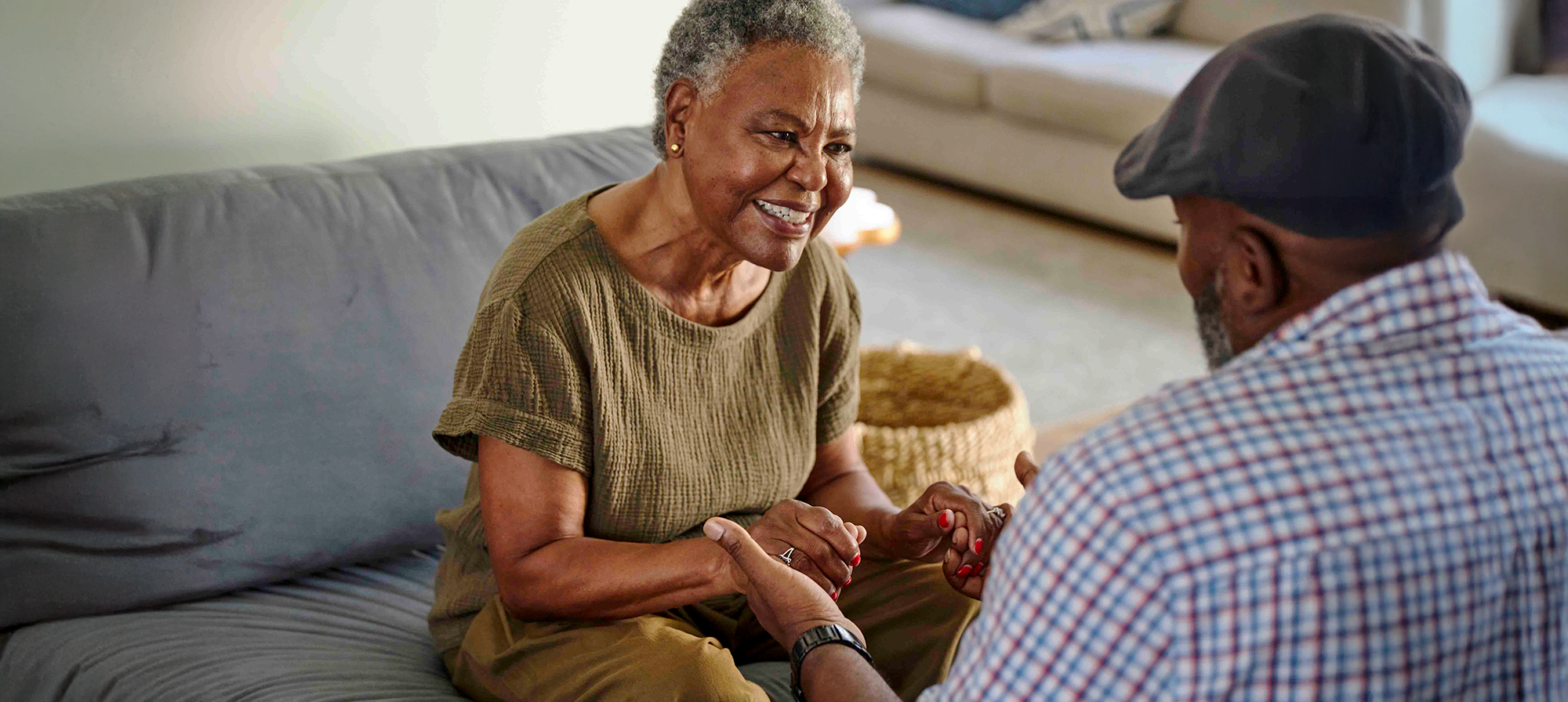When your adult child cuts you off, the chasm can seem as wide as the pain is deep. But there are steps you can take toward repairing the parent-child relationship—and healing yourself.
Much has been written about the unmatched pain of losing a child to an untimely death. But there is another, less discussed form of parental loss that, in many ways, can be as hard to bear: parental estrangement.
When a grown child ends the relationship by choice, a parent’s sense of loss can be as great as that felt after a death. What’s more, the response can be a complex mix of feelings that don’t end at grief. Feelings of failure, rejection, and even shame can well up. Over time, the emotional fallout of estrangement can even take a toll on a parent’s mental and physical health.
Many estranged parents are reluctant to talk about the issue. Still, findings suggest that parental estrangement, already the most common form of family rift, is on the rise. A Cornell University survey revealed that at least 10 percent of families report this form of estrangement.
“It really feels like estrangement is a silent epidemic,” said Dr. Joshua Coleman, a psychologist based in the San Francisco Bay Area who authored one large study on parental estrangement. “It’s a much bigger problem in our culture, in our society, than most people know about.”
If your child has stopped communicating with you, you may not know where to start in mending the rift and healing the hurt. Take some comfort in knowing that you are far from alone. More parents of adult children are finding themselves in the same situation.

Why adult children cut ties with parents
Parental estrangement may come suddenly. Or it may follow a slow fraying of the parent-child bond. Most often, the child is the one who chooses to cut ties.
Reported reasons range from harsh parenting and lack of respect to conflicts over values and lifestyle choices. Other common factors are issues with in-laws, spouses, and money.
But Coleman cites a couple of cultural trends that may have added to the recent rise in parental estrangement. One is the younger generations’ heightened focus on the self. In the past, cutting off parental ties was seen in a largely negative light. Today, he said, many young adults view cutting off their parents as an act of growth and empowerment. In addition, social media may play a role in supporting and encouraging them in their choice.
The other change is a new level of political friction in the United States. “We see rising rates of tribalism in identity politics,” he said. “Pew Research Center found that ‘political differences’ is now the single most important determinant of how people evaluate other people.”
According to Coleman, children who choose to cut ties often blame their parents for the estrangement, whether fairly or not. For parents in the Baby Boomer generation—who arguably have invested more heavily in their children’s success and happiness than any generation before them—this can be especially hard to take.

How to reconcile with your child
While your child may feel hurt by the estrangement, they’re also likely to experience some positives. You, on the other hand, might only feel heartsick, rejected, or betrayed. In fact, you might not feel ready or willing to reach across the divide just yet—and that’s OK. Give yourself time to process your feelings. But, if you want to and feel ready to reach out to your child, here are 7 steps that might help:
- Seek help from a qualified family counselor. A therapist who is experienced in family estrangement can lend support, as well as sage counsel. That can help you decide how to move forward in ways that make the most sense for you.
- Own your parental role. Realize that your child holds most of the power in this situation. Regardless of why you’re estranged, accept that most of the early work will fall to you if you hope to reconcile. As the parent, commit to taking the high road.
- Choose a constructive mindset. Just as you have a version of how the relationship fell apart, so does your child. Whether you agree with their reasons for cutting ties, try to empathize and understand. Realize that, for your child, breaking away looked like the healthiest path. Be prepared to listen without judgment to what your child has to say.
- Make the first move. Breaking the ice can be hard. It calls for emotional intelligence. For some estranged parents, one good place to start can be a letter of amends. In a letter of amends, you acknowledge and take responsibility for mistakes you’ve made. But you do this without attempting to justify or explain yourself. You show earnest compassion for what your child feels. You express your willingness to work on the relationship.
The letter of amends is a difficult step, and it should not be taken lightly. It’s very important not to write a letter of amends unless and until you can do so sincerely.
For more on how to write an effective amends letter, click here. - Be patient. You have let your child know that the door is open. Waiting can be the hardest step. You may feel vulnerable. You may feel you are tiptoeing around your child’s feelings. Just proceed with small steps. If you don’t receive a response in a month or two, you can send a follow-up note—something friendly and brief.
- Enter the new space. If your child is willing to talk, take care to leave emotional baggage behind and avoid certain pitfalls. For example, if your child seems negative and critical, simply listen with compassion and let them talk.
You do not have to agree with everything. But do not argue. Communicate without criticizing, shaming, or guilt-tripping your child. There may be topics you and your child agree to avoid for now. - Know when it’s time to move on. If your child doesn’t respond (or responds negatively), recognize that it might be time to let go. That doesn’t mean you are shutting the door on reconciling. It only means that you are turning your focus to taking care of your own well-being.
Reconciliation can take time. And not every rift can be mended. The best that you can do at this point is respect your child’s choice, even if you don’t understand it. No matter what mistakes you might have made in the past, you deserve your own peace and a sense of closure.
Healing the hurt of parental estrangement
The end of any close relationship signifies a deep loss. It can leave you feeling uncertain about what the future holds. In the case of parental estrangement, you may also be left with a sense of having fallen short in your most important job. You may fear being judged as a failed parent. That can lead you to withdraw from some of your social circle.
Give yourself time to accept the loss and to forgive yourself. That will put you in a much better position to reconcile with your child. And, if reconciliation doesn’t happen, you’ll be in a better position to move on with your life. These tips may help you move forward:
- Let your feelings flow. As unpleasant as some feelings may be, don’t try to deny them or repress them. Feel them. They won’t last forever. Find healthy ways to cope with them. For instance, you might try journaling or sharing them with someone.
- Don’t go it alone. Isolation tends to make things worse. Get support from friends and family. Work with a qualified therapist that you trust. Look for in-person or online support groups for estranged parents.
- Keep a healthy routine. Exercise. Eat healthy. Get the sleep you need. Sticking to a routine can restore a much-needed sense of order and assurance. It's also a good way to ensure you’re taking care of your basic needs.
- Take time to reflect. What benefits have you gained from this experience? What did you learn about yourself? You might even uncover clues from your own history that can shed some light on the relationship you and your child have had. Engage with these insights as you feel ready to.
- Get reacquainted with yourself. You have likely dedicated much of your energy to your child for decades. Along the way, you may have neglected some of your own interests. What are your goals? Unlived dreams? Which parts of yourself did you neglect over the years? Start to nurture these.
Resources for the estranged parent:
How to reconcile with your estranged adult child
Learn about marriage and family therapists
Rules of estrangement: Why adult children cut ties & how to heal the conflict
Help and healing for parents of estranged adult children
Not a Silver&Fit® member? Learn more about everything the program has to offer, including more helpful healthy living tips like this, here on our website.
This information is not intended to take the place of regular medical care or advice. Please check with your doctor before using this information or beginning any self-care program. Images used for this article do not depict any members of the Silver&Fit Program.
References
Coleman, J. (2021, March 2). Rules of estrangement: Why adult children cut ties & how to heal the conflict. Harmony/Rodale/Convergent Books.
Coleman, J. (2021, May 30). Rules of estrangement: Why adult children cut ties & how to heal the conflict [Video]. YouTube. https://www.youtube.com/watch?v=i-DmpQPXSgk
Dean, J. (2020, September 10). Pillemer: Family estrangement a problem ‘hiding in plain sight.’ Cornell Chronicle, Cornell University. https://news.cornell.edu/stories/2020/09/pillemer-family-estrangement-problem-hiding-plain-sight
Fingerman, K. L. (2017, November). Millennials and their parents: Implications of the new young adulthood for midlife adults. Innovation in Aging, 1(3). https://doi.org/10.1093/geroni/igx026
Gilligan, M., Suitor, J. J., & Pillemer, K. (2015, May 14). Estrangement between mothers and adult children: The role of norms and values. Journal of Marriage and the Family, 77(4), 908-920. https://doi.org/10.1111/jomf.12207
Kotsou, I., Leys, C., & Fossion, P. (2018, January 15). Acceptance alone is a better predictor of psychopathology and well-being than emotional competence, emotion regulation and mindfulness. Journal of Affective Disorders, 226, 142-145. https://doi.org/10.1016/j.jad.2017.09.047
O’Dair, B. (n.d.). How to reconcile with your estranged adult child. AARP. https://www.aarp.org/home-family/friends-family/info-2020/estranged-child.html
Parincu, Z. (n.d.). Radical acceptance: Definition, skills, & exercises. Berkeley Well-Being Institute. https://www.berkeleywellbeing.com/radical-acceptance.html
Pillemer, K. (2020). Fault lines. Yellow Kite Books.
Scott, E. (2024, September 27). How to apologize the right way. Verywell Mind. https://www.verywellmind.com/how-to-apologize-more-sincerely-3144467
This article was written by Candace Hodges, edited by Nora Byrne, and clinically reviewed by Elizabeth Thompson, MPH, RDN, on June 4, 2025.





